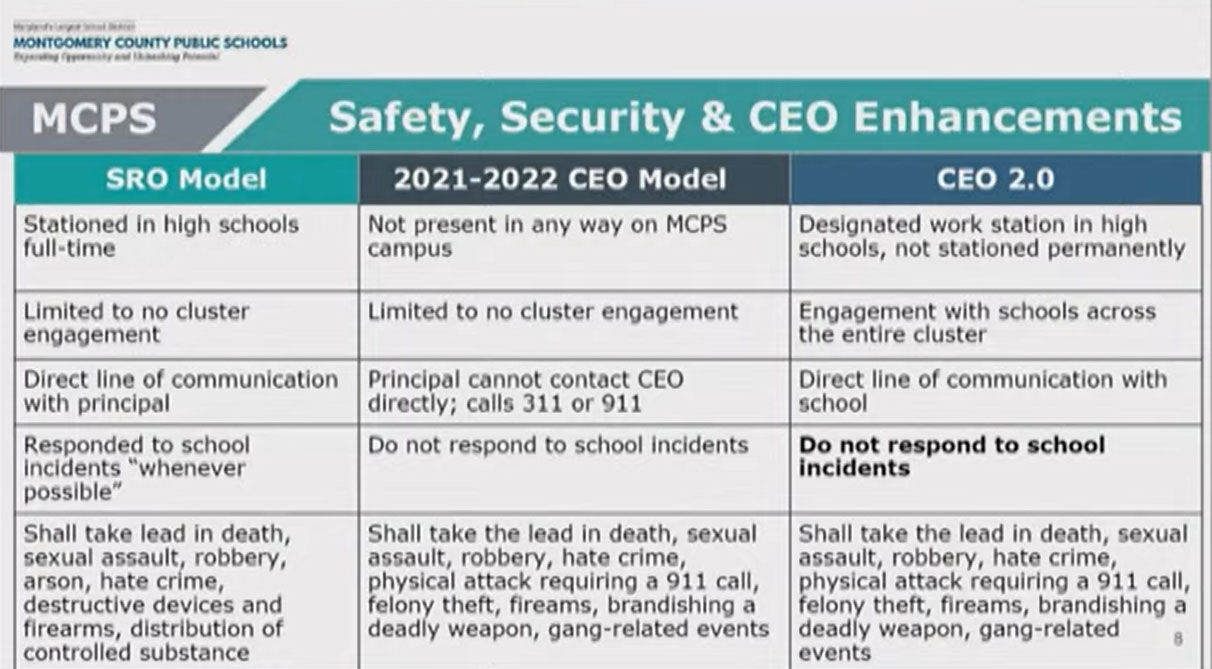Council members in Montgomery County, Maryland, are weighing in on a new agreement to return police officers to public schools with a more limited and strictly defined role.
School and police officials appeared before the Montgomery County Council Tuesday afternoon to formally unveil the “Community Engagement Officers 2.0″ plan, which received a mix of reactions.
Council member Craig Rice, who chairs the council’s education and culture committee said he believed the plan, while not perfect, strikes the necessary balance.
“We do not believe that we should be policing our schools, but at the same time need to provide safety and security for those folks that are in our school buildings,” he said.
While there has been concern about negative interactions with police, especially involving Black and Hispanic students, Rice also pointed to the “numerous people of color who testified and said that they wanted to make sure that our folks were safe” on school grounds.
Regarding the new agreement, Rice said, “This is a good starting point ….There is no black and white on this one. It is gray. It is in the middle.”

The role of police officers in the school system had been the subject of intense debate.
Last March, Montgomery County Executive Marc Elrich said school resource officers, or SROs, who had previously been stationed at all high schools, would be removed. In their stead, the school system rolled out the first version of the CEO program, under which officers were not present on MCPS campuses in any way and principals had to call 311 or 911 to reach a school officer.
That approach came in for a rethink after a shooting in a bathroom at Magruder High School in January. However, the Student Wellbeing Action Group, a student-led work group formed to study the issue, advocated for eliminating the police presence on school grounds entirely and replacing officers with mental health providers and restorative justice practitioners.
Under the new memorandum of understanding, the revamped version of the CEO program allows officers to have a designated work station at schools — such as in a principal’s office — but does not allow officers to be stationed in schools permanently or to patrol the hallways.
CEOs will also reestablish direct lines of communication with schools as part of the new plan. However, the officers will not enforce discipline or school policies. Instead, they will only take the lead in investigating serious incidents, such as a death, reported sexual assaults, robberies, physical attacks requiring a 911 call and incidents involving guns, among others.
Monifa McKnight, the superintendent of the school system, told council members that school discipline will be the purview of MCPS staff.
“There are so many challenges that are best solved by MCPS staff and not law enforcement … We’re owning that,” McKnight said.
She added, “That was a very big starting point for us to provide clarity to everyone: This is when you become involved; this is when you do not become involved.”
Montgomery County police Chief Marcus Jones said officers have already began to rethink their approach. In consultation with McKnight, Jones said the department is handling drug possession cases differently.
In the 2019-2020 school year, there were 300 arrests across the school system involving drugs in schools — most offenses involving marijuana and disproportionately involving minority students, he said.
Under the new approach, officers will come to the school to seize the drugs for destruction but discipline is handled by the school system. Referring to the conversations with school officials, Jones said, “You should discipline the student as you see fit, and we’ll stay out of it.”
McKnight also said dealing with mental health challenges and students’ overall well-being is a key part of making students feel safe at school. After getting off to a slow start, McKnight said the school system had recently hired 28 social workers to bolster mental health services.
“What we are experiencing right now in Montgomery County — that we’re seeing happening across the nation — we have some serious issues that may have come on more strongly because of the pandemic,” she said. “But there is a wellness issue that’s plaguing the entire nation right now, and we’re included in that.”
Under the new CEO 2.0 program, officers will check in with the principals at high schools in the morning and have a “collaborative conversation” about any security matters, said Carmen Facciolo, assistant chief of the community resources bureau. “They will then go on patrol and check in with the middle school and elementary school principals in the same fashion.”
He added, “There may be times when a CEO is in a school building, however .. they would be in that main office area or having a conversation with the principal. They won’t be in the hallways; they won’t be patrolling the schools.”
Council member Will Jawando, who had been one of the strongest critics of the old school resource officer program, said there was real harm to students from over-policing, disproportionately Black and Hispanic students.
“This idea that a police officer in a school equals safety is at best unproven,” he said. “There’s data that’s actually suggesting the opposite.”
Council member Hans Riemer said the new agreement “may not be everything I would like to see but I do want to take a moment to recognize there have been a number of significant changes and, I think, improvements as a result of several years of very difficult dialogue.”
He added, “I still believe that the best solution is one where we don’t need an officer in the school setting where we have counselors” and other trained personnel, including a “full wellness and health safety campaign that’s ongoing all the time to change the culture of the school.”








